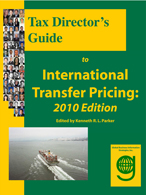Advance Pricing Agreements
Method By Which Related Parties May Value In Advance Goods To Be Transacted
Instead of waiting to see if your transfer pricing methodology is found to be acceptable by tax authorities, you may seek to enter into an Advance Pricing Agreement (APA) with the IRS. The IRS web site defines APAs as follows:
The Advance Pricing Agreement (APA) Program is designed to resolve actual or potential transfer pricing disputes in a principled, cooperative manner, as an alternative to the traditional adversarial process. An APA is a binding contract between the IRS and a taxpayer by which the IRS agrees not to seek a transfer pricing adjustment under IRC § 482 for a covered transaction if the taxpayer files its tax return for a covered year consistent with the agreed transfer pricing method.
APAs are not available for all transactions and do have up-front costs. There is a fairly extensive process of fact-finding and negotiation that goes into the development of an APA. This process is described in IRS Revenue Procedure 2006-9, which was published on January 9, 2006.
Extensive discussion of the US APA Program, as well as other APA programs around the world can be found in the Tax Director's Guide to International Transfer Pricing.
Before deciding whether to enter into an APA, it is useful to examine the process from the IRS perspective: what questions will you need to answer and what research will you need to conduct to satisfy the requirements of the program? Towards this end, the APA training materials used by the IRS can be very instructive. Here are some of the resources they use to train agents in the APA process and other relevant materials:
- Presentation on Adjusting Comparables Results
- APA Study Guide — Very useful resource for anyone involved in transfer pricing, even if you are not conduting an APA
- APA Annual Report Procedures, Checklist, and Resources
- APA Annual Report Flow Chart
- APA Annual Report Agent Instructions
- APA Annual Report Review Submission Form
- Presentation on OECD APA Guidelines
- APA Case Analysis Instruction Manual (Part I)
- APA Case Analysis Instruction Manual (Part II)
- Paper on Foreign Exchange Rate Calculations for APAs
- Presentation on Cost Sharing Arrangements
The main advantages of APAs are controlling risk and increasing predictability. The facts of a given situation dictate whether they are advantageous. Advance Pricing Agreements are further discussed in the following articles:
- Using Advance Pricing Agreements to Mitigate Transfer Pricing Risk
- Advance Pricing Agreements: Confidential Return Information or Written Determinations Subject to Release? (pdf)
- Currency in U.S. APAs: A Promise Honored in the Breach (pdf)
- Importer Alert: APA Prices May Not Be Applicable to Customs Valuation Process
Should your company seek an APA?
For insight an analysis of whether your company would benefit from an Advance Pricing Agreement in the US or another country, please see our new book, the Tax Director's Guide to International Transfer Pricing: 2010 Edition. This valuable resource includes discussion of APA programs in many countries, as well as other advice and insights from leading transfer pricing professionals that can help you to improve your company's transfer pricing strategy and compliance.
|
Tax Director's Guide to International Transfer Pricing: 2010 Edition |
More than fifty of the world's leading transfer pricing professionals offer their advice and insights on how to navigate complex issues, including:
• When is an APA Advantageous? The book also provides a country-by-country review of transfer pricing laws in seventeen major economies, addressing questions such as: • What transfer pricing methods are accepted? |

